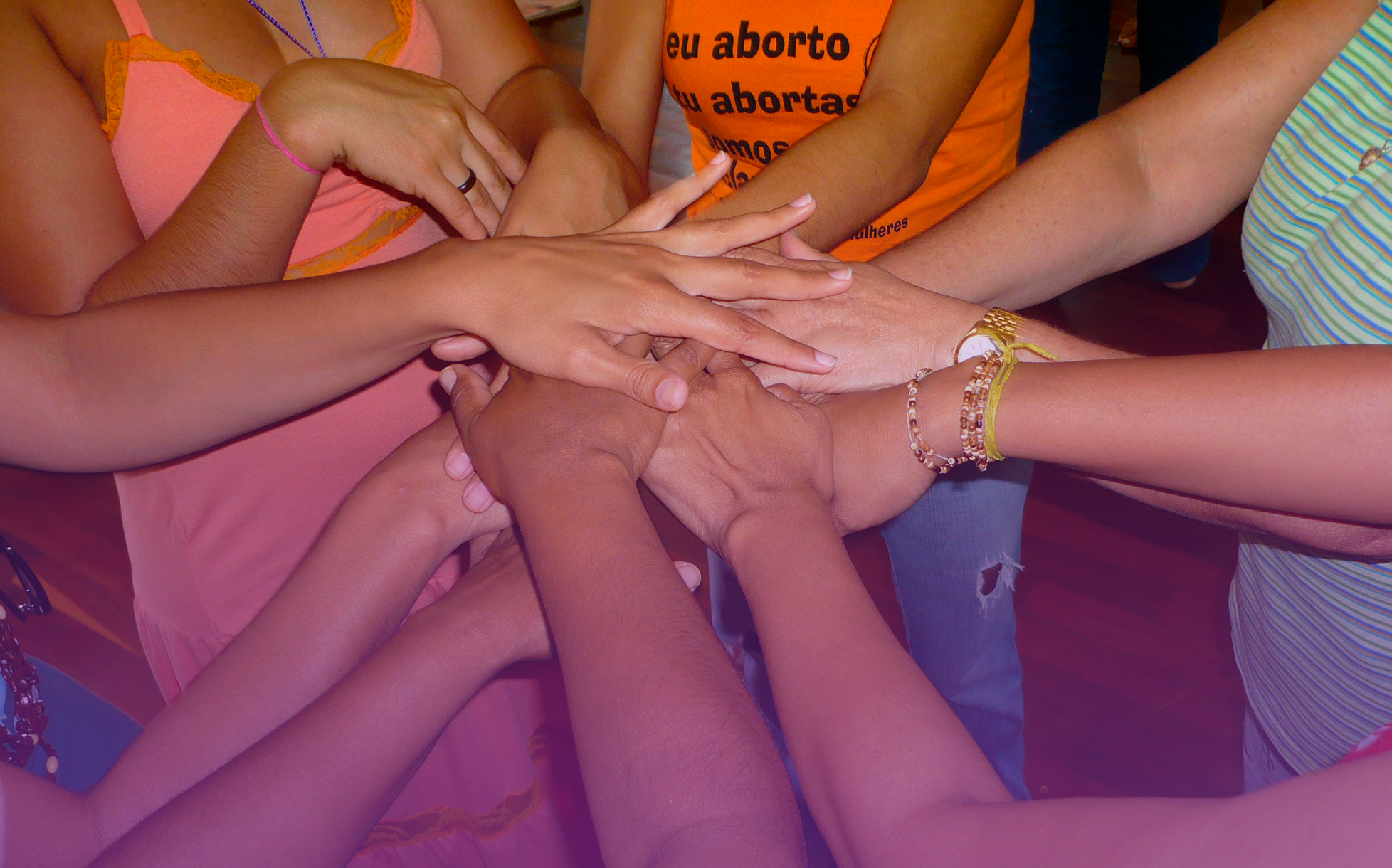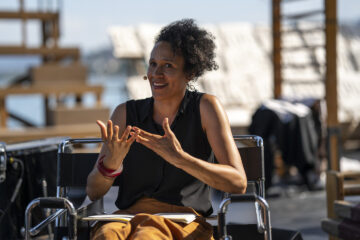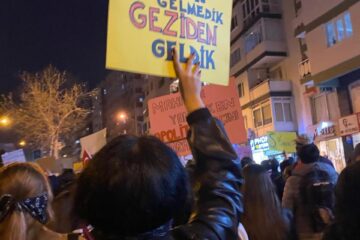Our methodology for decolonial grassroots feminist education derives from our vision for changing the world, based on the grassroots struggle and on what we understand as the role of building political actors. It is connected, therefore, to the organization of the movement. This organization always involves the process of political education, communication, mobilization, and action. Political education happens in specific moments, such as schools, courses, and seminars, but it is also part of how we organize within the movement, continuously and every day.
A mobilization or action out on the street often plays that role in political education as well.
Our role as educators is key for this education to be able to identify and develop views on conflicts that are often rendered invisible. The experience and the way we have been socialized and educated lead us to build skills within a hierarchical paradigm. Grassroots education leads us to the need for collective action toward change, in a coherent process between critical thinking and practice. This is a huge goal and involves constantly deconstructing and rebuilding on several levels. Looking at the world as a whole involves addressing several elements at the same time, such as fears, motivations, conflicts, self-esteem, biases, uncertainties, and many others.
Grassroots education must be part of a grassroots organizing project that involves political education, communication, mobilization, and action based on collective knowledge building. In grassroots education, a group-focused work is key to make collective knowledge building happen. The group is fundamental for us to be able to move away from an individual perception of problems toward understanding their social constructs.
The educational process has this goal of collective knowledge building from a critical and emancipatory perspective, which must be expressed in concrete practice of broader political building. Our role, as educators, is to organize and empower the group that is receiving the education, so that it can become a collective, contributing to dynamics of participation, integration, affectional bonding, and collective identity building that will become concrete through building the practice of political organizing.
First Steps: Agreements and Arrangements
Developing grassroots education activities with groups allows us to first work with more diverse experiences. Setting goals for an educational process depends on different starting points and accumulated knowledge and contributions. Political education activities are always defined by considering the audience with which we are going to work. The goals for initial processes from the base are different from those for groups that will go deeper into discussions or even for training educators, and so on.
In every educational process, it is important to discuss arrangements, for example, regarding punctuality, division of assignments, timekeeping, and participation. We have to agree, for example, that the word must be shared. These agreements provide us the elements to think about all the matters that the group needs to develop. In a longer process, these agreements must also be recorded and recollected.
In a long process, group dynamics can be more intense, as conflicts and tensions may emerge. Thinking about these arrangements requires sensitivity: when we work based on the experiences of groups about feminism, racism, and LGBTQIA+ experience, we are working with very sensitive topics. This is why it is always very important that these arrangements include a nondisclosure agreement: what people share about their experiences—for example, if someone has been a victim of violence—that is confidential information only the participants will know about. What we will be able to share and discuss with other people is the reflection that has been acquired and shared. Everyone must feel safe to be able to speak, knowing that their personal matters will not be addressed or documented against their will.
Participation
Our role as educators and facilitators is to make sure that the groups is actively taking part in the activities. So it is very important to focus on the dynamics and relationships. In grassroots education work, the concern is not only about developing the contents, but observing how the group is working, how the relationship between the people in the group is going, and how this group is effectively a group and not just a sum of people.
This actually entails building trust, bonds, and feelings of safety. This is why it is so important, right in the beginning of any activity, to take a moment for introductions: for people to acknowledge each other, see each other, and start building bonds and relationships.
When we say we are grounded in experience and reality, this also means acknowledging not only what they know about the content, but what their perceptions are, the snags and even their biases. Grassroots education is also made through decolonizing and building critical thinking.
Formulating Reflections
Overcoming dichotomies between reason and emotion is key in our feminist view. This becomes clear when we introduce playful activities and activities using our bodies, but it is also in everything. The way we discuss and reflect is not separated from experience and subjectivity.
Our role as educators is to make sure that this reflection happen. This often comes less from what is introduced and more from what the group, as a collective, builds and formulates.
In this sense, it is important to reflect on our position in the group. In grassroots education, we challenge and propose the disruption of hierarchies. Still, we, as educators, play a role and have a distinctive position in the group. We have the responsibility of conducting that group, of being the person to help building connections and trusting relationships. This is why people often tend to ask questions to the educator.
Our role is often to ask questions more than to provide answers; it is more about making comments so that people can talk and exchange their impressions and ideas.
Critical thinking is not automatically built—it goes through several levels. And reflection is what leads us to awareness building, as well as the instruments to conceive the action. We usually pose three questions that permeate the conversation: what is the problem we want to face? Why does it happen? How can we solve it?
Feminist Creativity
When we manage to really make the group work as a collective, it becomes a process of collective identity building, of spontaneity, creativity, and critical thinking between participants.
Learning through grassroots education comes from a vision that is the opposite of traditional education, which sees us as vessels of content. Colonization and alienation tend to stop us from exercising our spontaneity and creativity. This is why, in grassroots education, we aim to also work with other languages, such as drawing, acting, music, dance. It is a way for people to be able to develop other skills, even setting their own spontaneity and creativity free. This way, as a process of deconstruction and rebuilding, we strengthen critical thinking and work on values of liberation and solidarity.
We also have been working on this dimension through the mística [grounding spirituality], broadly understanding it by pervading our action as a whole, with different forms of expression, including our symbols, our songs, our slogans.
Three Moments of Political Education
Based on our experiences, we have developed a way of thinking that separates the political education activity in three moments. The first moment, which we call welcoming, is upon arrival, to dissolve tensions. Each person arrives with their own worries and anxieties. Welcoming is the moment to get people to focus, to bring them to the moment.
In a political education activity, we usually use the welcoming moment to work on body awareness, in many different ways, like a massage or a dance routine. It is the moment to work on group activities that can reinforce the bonds between the group. An example of activity that we have done in this sense was asking participants to write down a quality about the person to their right and a quality about the one to their left and put it in a box. Then we randomly picked the pieces of paper and asked the group who had that quality or virtue. This way, people start to recognize those qualities and virtues in more people, beyond that first step of the activity.
After each group activity, we ask how people felt. This questions provides the perception about the moment—whether it was good or constructive, whether it provides a subjective dimension and provides us elements about what we have to work on. Talking about feelings is a way to work on subjectivity and have elements to manage group relationships.
The second moment is topic development, where we start by splitting the group into smaller groups. There are several ways to propose the smaller groups to provide their first reflections: they can create and perform a scene, create a collage with newspaper clips, create a radio show. After the group makes their presentation, it is important to take the time to talk about what the group came up with and how they felt while doing the assignment. In addition to reflecting on the content, they are also developing their creativity and spontaneity. The educator can observe and see if everyone is taking part, if there is engagement, if someone is being left out, if there are questions. By the end of this moment, the topic is systematized and further discussed. The topic is not developed beforehand: it changes and becomes more defined as the discussion happens.
The final moment is assessment. It is important not to end a political education process without assessing it, even if using just one word. This assessment will show how the group felt about it and what they have retained. It is also a good moment to talk about the methodology that was used. It is a way of learning what a methodology is and demystifying it, understanding that it can be a topic for everyone to discuss.
Being an Educator Also Means Changing
An educator must be flexible and patient. This requires a deep process of self-knowledge that we build over time. So it is very important to take a moment to also assess our own practices. In the movement, in the team we work with, we must think about what is working and what is not, even to realize what is hard for us. For example, sometimes in a group, we are more patient with some people than with others. It is important to make an effort to understand within ourselves how our patience operates.
Part of this self-knowledge process includes identifying what we struggle with and how these things also have an influence in group dynamics. It also happens when there are conflicts within the group. We cannot think that we can solve all conflicts, but we can create spaces to talk about them. Political education must be a space where people can express their perception and, based on that, look for elements to solve it collectively, learning with the process.
____
This article is based on a presentation given during the School of Facilitators organized by the World March of Women, the Grassroots Global Justice Alliance, Grassroots International, and the Indigenous Environmental Network—IEN. The School of Facilitators was a stage after the International Feminist Organizing School (IFOS). We will soon publish an article focused on the experience of the School of Facilitators.
____
Nalu Faria is a member of the World March of Women International Committee, representing the Americas.




